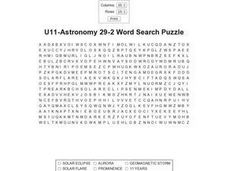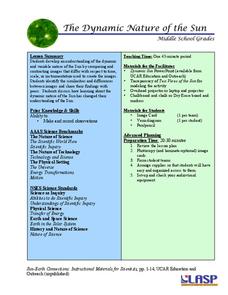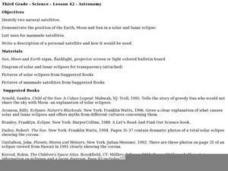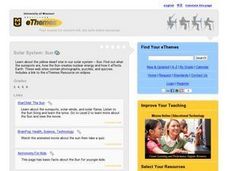Curated OER
Lesson Plan # 1 - Phases of the Moon
Students explore and identify moon phases, watch teacher demonstration of different phases using globe and flashlight to represent moon and sun, and discuss reasons why there are moon phases.
Curated OER
Astronomy 29-2 Word Search
In this science worksheet, students locate and identify various vocabulary terms related to space science. There are 9 words/phrases located in the puzzle.
Curated OER
The Earth-Moon System
In this Earth and moon worksheet, students will review the different phases of the moon, how eclipses are created, and how the moon influences tidal patterns. This worksheet has 13 fill in the blank, 8 true or false, and 2 short answer...
K5 Learning
The Moon
Second graders read a short informational text passage about the moon and answer a series of questions based on what they read.
PHET
The Dynamic Nature of the Sun
In this second lesson of the series, pupils learn to observe similarities and differences in photos of the sun and record them in a Venn diagram. Then, small groups practice the same skill on unique images before presenting their...
Curated OER
Space, the Final Frontier...
Students study a common theory on how the solar system was formed and examine the relative scale of the size and distances among the bodies of the Solar System.
Keep it Simple Science
The Earth in Space
Skim the surface of the earth with this brief, compact, summary of outer space. The sun, stars, galaxies, planets, and phases of the moon can be found in this all-in-one resource. Seventh graders will enjoy these simple worksheets to do...
Big Kid Science
Measuring Shadows Using an Ancient Method
How did ancient peoples determine the height of really tall objects? Young scientists and mathematicians explore the concept of using shadows to measure height in a hands-on experiment. Paired pupils measure shadows, then calculate the...
University of Texas
Observing the Moon
Why does it look like there is a man on the moon? Why does the moon look different every night? These are the focus questions of a lesson that prompts class members to observe and record the nightly changes of Earth's natural...
American Museum of Natural History
Moon Flip Book
Flip over the phases of the moon. Using an interactive, pupils view the location of the moon relative to the sun and earth for the eight major phases of the moon. Individuals record how the moon looks through a complete cycle. Using...
Curated OER
Computer Activity-The Sun
In this computer activity worksheet, students visit a website and take a Virtual Tour of the Sun. While navigating through the site, they complete 16 fill in the blank questions.
Curated OER
Astronomy Merit Badge
Students explore astronomy through the Starry Night Constellation Adventure software. They print star charts and identify constellations. They sketch the Big Dipper and describe the Milky Way. They list the five most visible planets and...
Curated OER
The Reasons for the Season
Students explain the reason for the changes in season. In this lesson plan examining the relationship between the Earth and the Sun, students use an applet to discover how the alignment of the Earth and the Sun cause the change in...
Curated OER
Science - Lesson 42 - Astronomy
Third graders demonstrate the position of the Earth, Moon, and Sun in a solar and lunar eclipse. They list uses for manmade satellites and write a description of how a satellite would be use.
Curated OER
Space: The Final Frontier
Sixth graders construct a graph to demonstration information that they've learned about the solary system. They also write or illustrate a sonar or lunar eclipse.
Curated OER
The Path of the Sun: The Ecliptic
Students investigate the celestial sphere and the paths it takes in the solar system.
Curated OER
"Space" Investigations
Sixth graders understand the patterns of change observable on Earth as a result of the movement of the different bodies in the solar system. They identify the physical characteristics of the different components of the solar system.
Curated OER
I Want to Believe: Astrologers and Sceptics in King Lear
Students examine two conflicting writings on solar eclipse that occurred on Black Monday and discuss them in the context of Shakespeare's King Lear. In this Shakespeare lesson, students discuss astrology and read the speeches made in Act...
Curated OER
Watch This Space!
In this space learning exercise, students, with a partner, answer five questions about the universe and read and discuss ten questions regarding astronomy.
Curated OER
Moon Phases
In this moon phase learning exercise, students are given a "moon pop" and they make a diagram of the moon's phases using the "moon pop" as a guide. They answer questions about the phases of the moon and solar and lunar eclipses.
Curated OER
Solar System: Sun
Students research information about the Sun, sunspots and how the Sun creates nuclear energy. They investigate how the Sun affects Earth.
S2tem Centers SC
Seasons
Winter, spring, summer, and fall—take the learning of the seasons beyond the elementary level to the middle school classroom. Curious learners begin by watching videos about the seasons and the rotation of planet Earth. Then,...
Columbus City Schools
Moon Phase Mania
Now you see it, now you don't. Our moon seems to pull a disappearing act from time to time—but why? Take your seventh grade scientists above and beyond to discover the truth about the moon and the role it plays in Earth's little...
Journey Through the Universe
How Far is Far?
The earth only revolves around one thing — and it's not any of your pupils. The lesson includes two activities dealing with the distance to the sun and the moon. First, scholars create a pin hole camera and use the rules of similar...
Other popular searches
- Solar Eclipse Demonstration
- Classroom Solar Eclipse
- Solar Eclipse Activity
- Lunar and Solar Eclipses
- Review Solar Eclipse
- Partial Solar Eclipse
- Solar Eclipse Stories
- Solar Eclipse Worksheet
- Stained Glass Solar Eclipse
- Solar Eclipse Art
- Lunar v. Solar Eclipse
- Science Solar Eclipses

























